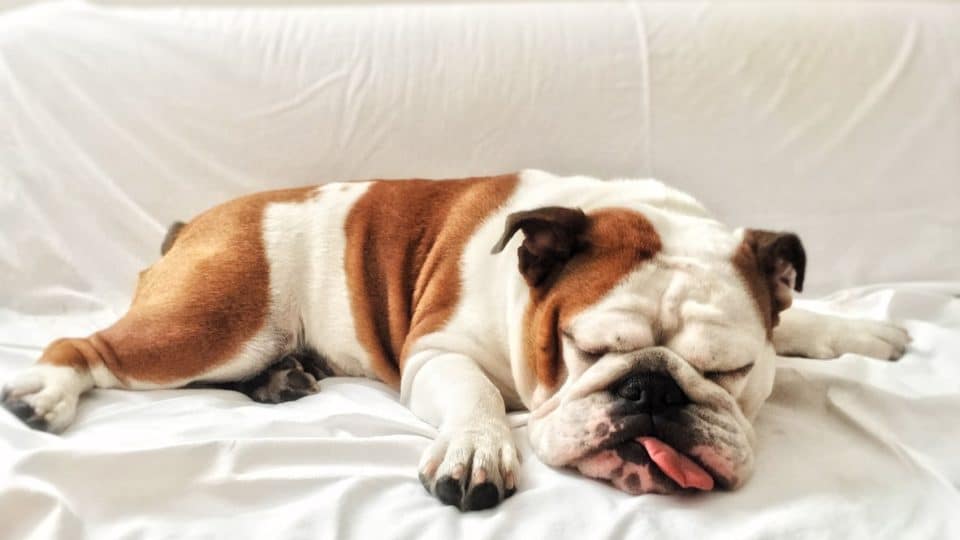- Not a substitute for professional veterinary help.
Dogs spend a lot of their time sleeping, but how much is too much? While it’s normal for dogs to snooze more than humans, excessive sleeping could signal an underlying issue. Understanding what’s normal and what affects your dog’s sleep can help you ensure they’re healthy and well-rested.
Most dogs snooze 11 to 12 hours a day, but excessive sleeping could point to a health issue, says Annie-Mae Levy, a certified dog trainer at Woofz.
Keep reading to explore why dogs sleep so much, the difference between normal and excessive sleep, and tips for promoting healthy rest. We’ll also cover when to call the vet and answer common questions about dog sleep habits.
What Makes Dogs Sleep More Than Usual?
Sometimes, dogs sleep more than usual for various reasons. Dr. Nell Ostermeier, a veterinarian with Figo Pet Insurance, says it’s important to pay attention to your dog’s sleeping patterns and any other changes to figure out if something is wrong.
Age
Puppies sleep more because they need extra rest to grow. She says their busy energy during playtime also makes them tired.
Older dogs often sleep more because their metabolism slows down. This means they use less energy and tire more easily.
Breed
Some dog breeds are naturally more active, while others are more laid-back. High-energy breeds, like Border Collies and Jack Russell Terriers, usually sleep less.
In contrast, laid-back breeds, such as Great Danes and English Bulldogs, often enjoy extra nap time.
Health
Health issues can make dogs sleep more. Healthy dogs typically rest on and off for at least half the day, but if your dog seems overly tired and shows other symptoms like loss of appetite or stomach upset, it might be a sign of a problem.
Common health conditions that can cause extra sleep include hypoglycemia (low blood sugar), parvovirus, kennel cough, arthritis, cancer, and kidney failure.
Activity level
Dogs that are very active or work hard, like service dogs, may sleep more to recover. However, dogs that aren’t getting enough exercise might also sleep more simply because they’re bored.
Levy says there should be a balance between activity and rest. This gives dogs a good mix of stimulation, play, and rest each day.
Environment
A dog’s living space can affect their sleep. Levy says dogs in busy households may sleep less, while dogs in quiet settings may sleep more.
Dogs left alone for long periods might nap out of boredom. In this case, you might hire a dog walker for days you’re away for an extended period.
Weather
Dr. Ostermeier says weather changes can influence sleep. Dogs may sleep more during extreme temperatures, like hot or cold days.
Loud weather events, like storms, or changes in your routine can make dogs sleep more or act differently.
Normal vs. Excessive Sleeping
It’s normal for dogs to sleep more than people. Levy outlines the average sleep time per day for dogs:
- Puppies: 18–20 hours
- Adults: 12–14 hours
- Seniors: 16–18 hours
Levy explains that a dog’s sleep schedule usually includes naps during the day and a longer nighttime rest. If your dog wakes up refreshed and seems ready for an activity, they have likely had high-quality sleep.
To tell if your dog’s sleeping too much, notice their behavior during awake times. If they seem unusually tired or uninterested in activities, talk to your vet.
When Is Sleeping Too Much a Concern?
Most dogs sleep a lot because they naturally need more rest than people.
However, Dr. Ostermeier warns that excessive sleep might be a concern if your dog shows other signs, such as:
- Changes in appetite or thirst
- Loss of interest in favorite activities
- Unusual tiredness or lethargy when awake
These symptoms could point to minor age-related changes or more serious issues like illness or injury. A vet can help identify and address the problem.
How to Support Healthy Sleep For Your Dog
To support healthy sleep, Annie-Mae Levy recommends these tips:
- Create a comfy sleep space: Dogs sleep best in quiet, dark, and cozy areas. Provide a comfortable bed in a spot away from noise and foot traffic. Use blackout curtains or dim the lights for added comfort.
- Stick to a routine: A consistent daily schedule for walks, meals, playtime, and rest helps regulate your dog’s internal clock. Regular routines make it easier for your dog to know when it’s time to sleep.
- Keep them active: Daily exercise improves sleep quality. Mix in walks, playtime, puzzle toys, and training activities. Let your dog wind down in the evening by avoiding overstimulation before bed.
- Watch mealtime: Feed your dog their last meal a few hours before bed to prevent discomfort. Keep water available throughout the day and night to prevent dehydration.
If these steps don’t help, consult your vet. For ongoing sleep issues, your vet might suggest natural calming aids like lavender spray or CBD treats.
Takeaway
Every dog’s sleep needs are different, but proper rest is essential for their well-being. Ensure your dog gets daily exercise and a cozy sleeping spot to support healthy habits.
If your dog’s sleep patterns change or you notice unusual symptoms or behaviors, consult your vet for guidance.



